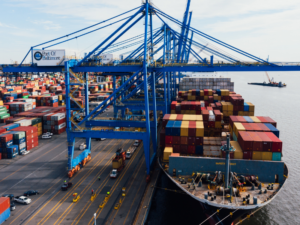Although the vast majority of cargo delivered by road, air or sea arrive at their destination undamaged and on time, like anything, there are still a number of inherent risks attached. In the event something goes wrong, be it controllable or uncontrollable, freight insurance covers the partial or total value of your cargo.
Insurance for freighted goods isn’t just something individuals should consider, businesses delivering products via freight should also weigh up the pros and cons of buying insurance with respect to their business model. As more and more consumers shop all range of products through online channels, untimely delivery or damaged goods will reflect poorly on the reputation of your business, irrespective of whether you’re at fault or the freight company is.
So, is freight or transit insurance worth it? And how much is freight insurance? As Australia’s freighting specialists, Freight Match are here to run you through everything you need to know about freighting insurance so that you can determine whether or not it’s worth it in your particular situation Continue reading to learn more!
What Is Freight Insurance?
Freight or shipping insurance is a policy put in place by a third-party company that insures a percentage of value or the total value of your cargo if the product is lost, stolen or damaged in transit. Such insurance goes above and beyond the carrier’s default protection policy, which they’re legally obliged to have.
With insurance in place, your customer or recipient can rest peacefully, knowing that they’ll receive either a full reimbursement or a timely replacement. As the shipper, you won’t have to pay out of pocket to cover the damaged or lost goods.

How Does It Work?
If you’re familiar with the general structure of insurance policies for things such as dental, health, automotive and more, then you should be familiar with how shipping insurance works – it’s almost the same thing!
When you order insurance for freight services, you’ll negotiate the terms of the policy and pay a premium that is dependent on a pre-determined contract. Like other insurance policies, the better the policy is, the more you’re going to pay, and vice versa. Typically, the policy will base their rates based on your cargo’s total value; however, this percentage is usually lower than that of most other regular insurance policies.
Risks Attached To Freighting Without Insurance
So, just what can go wrong during the freight process? What will freight insurance be protecting you against?
When sending products or cargo by freight, here are some of the risks you’d be covering yourself against with insurance.
- Lost goods – When the package is shipped to the wrong destination or becomes lost during the transit process
- Delayed services – Most relevant for time-sensitive products, plenty of external, unforeseen events can delay the shipment of your goods, be it anything from road accidents, border closures, car failures and more.
- Risk of accident – Australian roads can be dangerous at the best of times, given the bustling nature of our cities and heavy traffic. Road accidents are one of the most common risks when it comes to road freight.
- Driver negligence – The journey from A to B can be filled with plenty of unexpected road bumps and curves, meaning it is crucial for your goods to have the right packaging with protective capabilities. If you don’t have the right packaging for fragile packages, your entire shipment is at risk.
- Natural disasters – Natural disasters and extreme weather conditions can pose a substantial risk to your cargo, making it more dangerous to travel or simply delaying the process beyond the ETA.
The main risk of going without insurance will be the cost of sending a replacement to the customer, or the monetary reimbursement given to the affected customer. For singular, lower-priced goods, this may not be a massive problem in the scheme of things for your businesses bottom line. However, if large volumes of your products are affected, or if a particularly expensive product is affected, then this will obviously be a substantial problem. If you go without freight insurance, you’ll have to calculate errors in your loss prevention strategy or budget.
It’s also worth keeping in mind that to receive reimbursement for a good affected during the freight process, the carrier itself must be deemed to be at fault for the lost or damaged item.

The Benefits Of Freight Insurance
If you’ve got insurance to cover your goods as they’re being freighted, you’ll:
-
Experience peace of mind
Life is busy enough without having to worry about the safe delivery of your freighted goods. If you’re covered by insurance, you’ll be able to experience peace of mind knowing that in the event of damage or misplaced cargo, you’ll be reimbursed.
-
Protect the reputation of your brand
Even if your company was not at fault for the untimely or damaged delivery of goods, consumers are likely to still associate the experience with your brand, not the freighting company. For companies that predominantly deal through e-commerce, shipping and timely delivery are crucial aspects of your offering and thus representative of competence. Insurance and the use of a reputable, reliable freighting company offers a level of protection for your brand that is undeniably worth it.
-
Be protected against high replacement costs
If something happens to your package while it’s uninsured, the burden is on you to cover costs in the event of damaged, lost, or stolen goods. Insurance delegates this responsibility and protects you against excessive replacement costs.
How Much Is Freight Insurance?

Freight insurance as a whole isn’t standardized; there are a number of moving parts that will influence the final cost of your insurance package.
From freight classification, general liability, prior loss history, the size and nature of the cargo itself and the company you choose, there’s plenty of factors that go under consideration before you’re given a quote.
When it comes to insurance, you should expect a rate between 0.25 cents and 0.75 cents for every $100 of the Commercial Invoice Value (the price the buyer paid). Anything under this general range is too good to be true. Anything above this range is potentially overpriced.

Is Freight Insurance Worth It?
All things considered, freight insurance is most definitely worth it in a number of instances and is essential when:
- Shipping fragile goods
- The total cost of your shipped product is high
- The product(s) are time-sensitive
- Brand reputation is particularly important for you
In saying this, if you’re shipping goods that are durable or low in total value to a point where budget is not affected, or if your recipient is not fussed by a late arrival time, insurance may not be entirely necessary.
Likewise, if you’re going through a reliable, cost-effective, transparent, and efficient freighting service like Freight Match that you trust to get the job done without fluff or fuss, insurance may not be necessary.
At Freight Match, we provide tailored solutions across Australia for packages, parcels, and goods of all descriptions. An online freight matching service that lets you find freight options in seconds, we guarantee expert, timely delivery that keeps your goods in perfect condition.
If you have any queries at all, simply call 1300 419 825 to speak with a member of our friendly customer service team. Get a quote for your parcel today!
